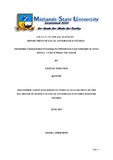Please use this identifier to cite or link to this item:
https://cris.library.msu.ac.zw//handle/11408/4071| Title: | Information Communication Technology for Zimbabwean Local Authorities in service delivery. a case of Mutare City Council | Authors: | Marange, Leonah | Keywords: | information communication technology service delivery local authorities |
Issue Date: | Jun-2017 | Publisher: | Midlands State University | Abstract: | The researcher was researching on a topic entitled Information Communication Technology for Zimbabwean Local Authorities in service delivery. The aim of this research was to establish the impact of the ICT system in addressing the challenges facing Zimbabwean local authorities in the delivery of services, with particular reference to City of Mutare. The research was undertaken in wards 5 and 16 respectively of Mutare urban. City of Mutare was perceived as having insurmountable challenges which had greatly compromised its capacity to deliver services to the residents of Mutare. The challenges have led to performance gaps resulting in the City of Mutare providing inadequate services or no services at all. The researcher further highlighted the research objectives which are to determine whether ICT is beneficial or not to the residents, employees and management itself, determining the consequences of ICT system and suggested possible solutions to these prevailing problems .This has resulted in the Mutare city as a council to recognise the significance of ICTs in addressing service delivery .The researcher used both quantitative and qualitative methods in presenting data. The study was informed by both primary and secondary data. Primary data was gathered from a sample size of 20 who were conveniently selected as the author used purposive and systematic sampling from a total of 140 000 population and this was determined after considering the budget and timeframe of the researcher. The data was gathered through documentary analysis derived from the journals, and books as well as reviewing the various data analysis done in relation to the assessment of ICT in enhancing service delivery provision, interviews, questionnaires, observations and council documents were used as well by the researcher. The study confirmed some of the operational challenges to include lack of IT skills, and lack of clear understanding of ICT as well as training. The research established that the challenges facing City of Mutare were related to capacity issues, financial aspects inadequacy of the ICT infrastructure, lack of well-drilled ICT manpower and this has led to performance gaps resulting in the City of Mutare providing inadequate services or no services at all. Findings from previous literature revealed that there are constraints faced in the operations and utilization of ICT.The researcher identified a plethora of challenges being encountered by the C. O.M in the implementation of ICT such as inadequate financial system, lack of well- drilled ICT manpower and the chief problem is that the C.O.M is still lacking in ICT infrastructure for it to provide services effectively and efficiently. Although the city is being affected by these insurmountable challenges, it is striving to implement ICTs earnestly as depicted by its use of ICT tools in service delivery such as the E-payment services, Websites to advertise and attract investors and the use of an SMS hotline based platform. The researcher recognised that the C.O.M unlike other Zimbabwean local authorities is trying its best in moving from a paradigm shift of operating and providing services manually to the new public management of operating electronically in the provision of efficient and effective services by engaging private players and twinning with other donor funding programs to boost its revenue base and for resources mobilisation as these supply both technical and financial assistance to accelerate ICT programs. This study provides an effective solution to identified challenges and impact as well as strategies to be adopted in order to reduce the failure rate of ICT. The implications of the findings are that unless the limitations dubbed above are resolved, ICT in the Zimbabwean local authorities will continue to experience insurmountable service delivery challenges, poor economic growth and development. Therefore, the study recommended on Chapter 5, that City of Mutare should adopt strategies such as including all stakeholders in ICT planning and implementation as it creates a sense of ownership and help in the mobilization of resources, engaging private players for boosting their revenue base and in order for them to try to reverse and halt the service delivery deterioration. | URI: | http://hdl.handle.net/11408/4071 |
| Appears in Collections: | Bsc Local Governance Studies Honours Degree |
Files in This Item:
| File | Description | Size | Format | |
|---|---|---|---|---|
| ICT...Disk drive...FINAL COPY.pdf | Full Text | 1.64 MB | Adobe PDF |  View/Open |
Page view(s)
398
checked on Feb 14, 2026
Download(s)
536
checked on Feb 14, 2026
Google ScholarTM
Check
Items in MSUIR are protected by copyright, with all rights reserved, unless otherwise indicated.



